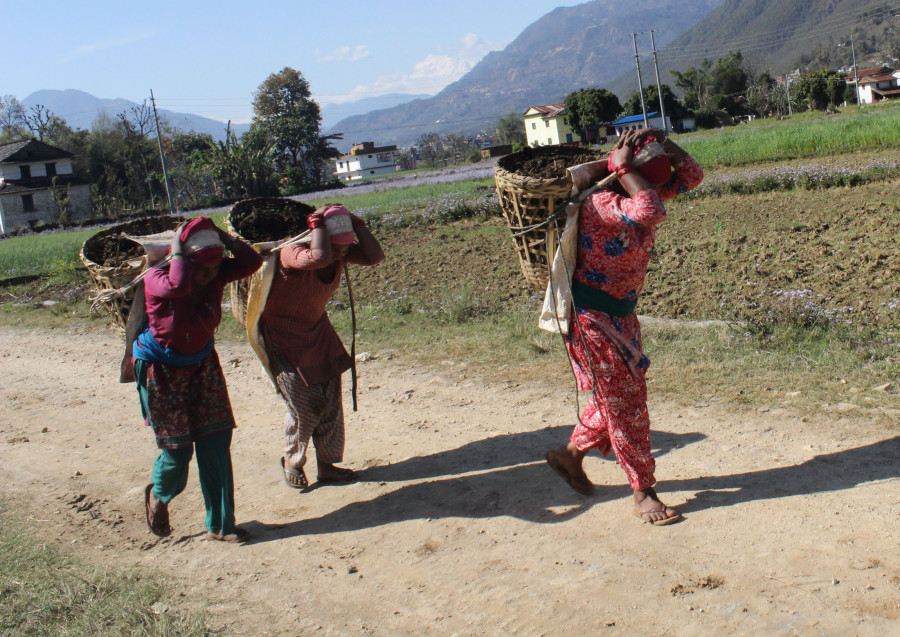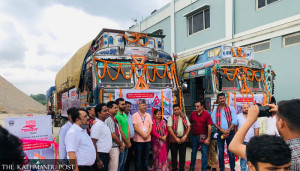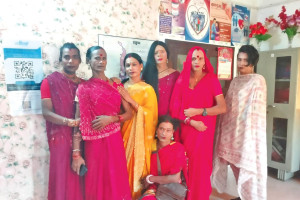Money
Infection fears force farmers to do it alone
The pandemic has ended the tradition of working in each other's fields during the busy season, say farmers.
Agandhar Tiwari & Prakash Baral
Farmer Ananda Hamal of Kushma Municipality-9, Parbat is afraid to step out of his house after two of his neighbours died due to Covid-19 two weeks ago.
For farmers like him in Gandaki province, this is a busy season when they sow paddy seeds and remove weeds from the corn fields, and so they have to help each other
But it is a different situation now. Farmers are not seen in the fields because almost all villages in the province have been impacted by the pandemic. The situation in the villages paints a gloomy picture of how the pandemic may affect food security and also the country’s economy which is already reeling under severe stress.
The farm sector, which employs around 60 percent of the national population, contributes one-fourth to the country’s gross domestic product.
"As everyone is getting infected, the old tradition of exchanging farm workers has been discontinued this year," said Sita Adhikari of Kushma-10, Pipaltari. “After helping one family, the group rotates to all the farmers' houses. That’s no more the case now.”
Although there are no records of the number of infected villagers and those who recovered from the virus, the situation is dire in every village, said Manrupa Lamichhane of Phalebash-4.
“There is no way to go to other people's homes. Most of the farmers are forced to work on their own,” he said. “Due to the fear of Covid-19 transmission, we have not invited any outsider," she said.
Working together in the fields not only meant sharing the work, but it was also an effective way to build bonds and help solve economic and social problems faced by the farmers. “The labour sharing culture has solved the labour crisis to some extent in many villages,” said Jagat Parajuli of Kushma-9. "But the coronavirus broke all the social relations and the years-long tradition," he said.
Bhavikala Roka of Argal, Tarakhola Rural Municipality-2, Baglung requires a huge number of farm labourers, but the farm labour exchange system had made her task easy. She had more than 20 neighbours helping her to remove the weeds from her maize fields last year. Roka also goes to other farms to return the favour.
But this year, only her family members are working in the fields. “The neighbours that helped us last year are infected. Many were notified during contact tracing, so we did not invite them,” said Rokka. "Besides, due to the prohibitory order, people cannot gather in one place. So, this year, we are forced to do the work by ourselves."
“We are also keeping distance between ourselves while working in the field,” she added.
It is time to weed the Chaite paddy or spring paddy fields in Basaha Phant, Aagkhet and Charaundi Phant of Galkot in Baglung, but farm hands are not easily available.
According to Jhabindra Budhathoki, a local of Badigad Rural Municipality, the farmers in his village have been suffering a lot due to the high number of infections and deaths. “We have been taking care of the livestock of those families who have been infected with the virus.”
Farmers who used to take their animals away for grazing are now forced to keep them at home.
Farmer Ram Bahadur Gharti Magar said people in Dhorpatan Municipality-9 fear to go out of their homes. "We have not been able to graze the animals," said Gharti Magar.
Farmers in Gorkha have already started weeding the spring paddy and maize fields, and started sowing paddy seedlings in the nurseries; but this time they are forced to do it alone.
Laxman Kumal of Bhimsen Thapa Rural Municipality-7 has just finished weeding his 10-ropani field where he has planted spring paddy. "This year, our family members did all the work," he said.
Gita Shrestha of Mailung in Gorkha said that farmers are unwilling to work in other people's fields even if they are offered a lot of money. "Those who own oxen can plough their fields, but others have to hire farm labourers. And it’s not easy to get them this year. Everyone is scared."
According to locals, some infected people from Mailung and Kyamuntar have been forced to work in the fields because they don’t have alternatives like before. "We need to work in the fields even though we are scared. But we will not be helping others like we used to before," Shrestha said.
Ramhari Kumal of Kymuntar said he used to work at construction sites, but he has stopped doing so now. Nowadays, he has been weeding his own maize and paddy fields.
Parashuram Adhikari, chief of the Agriculture Knowledge Centre, Gorkha, said due to the impact of the lockdown, they were not able to provide help to the farmers this year.
In Myagdi, farm work is progressing, but the traditional way is no more. "There is no situation to invite other farmers to work in one's fields. Our family members are supporting each other," said Raju Garbuja of Annapurna Rural Municipality-8, Ramche. “With the infection spreading rapidly, marriages and other social functions have stopped totally in the hilly area.”
In Tanahun too, the coronavirus has impacted agricultural activities. With the local administration imposing a restriction order, the farm and livestock sector has been affected in particular.
Farmers have been facing problems such as not being able to get their produce to market and buy fertilisers, seeds and animal feed due to the lockdown, said Uma Thapa of Ghiring Rural Municipality-1. "We used to work in each other's fields by forming groups of 20-25 people each. But now people do not work together."
Aash Kumari Gurung of Lamjung goes to her farm wearing a mask. She is busy weeding her maize field. "I need to stay safe from the pandemic and at the same time I also need to work in the field," Gurung said. "Rather than gathering a crowd, we are working with family members only,” she said.
Hom Prasad Luintel, chief district officer of Lamjung district, said that even though a prohibitory order has been imposed, it has not halted farmers from working in their fields. "But we have told them to follow the health safety protocols.”
(Hariram Upreti in Gorkha, Ghanshyam Khadka in Myagdi, Samjhana Rasaili in Tanahun and Aash Gurung in Lamjung contributed reporting.)




 14.12°C Kathmandu
14.12°C Kathmandu.jpg)
.jpg)













